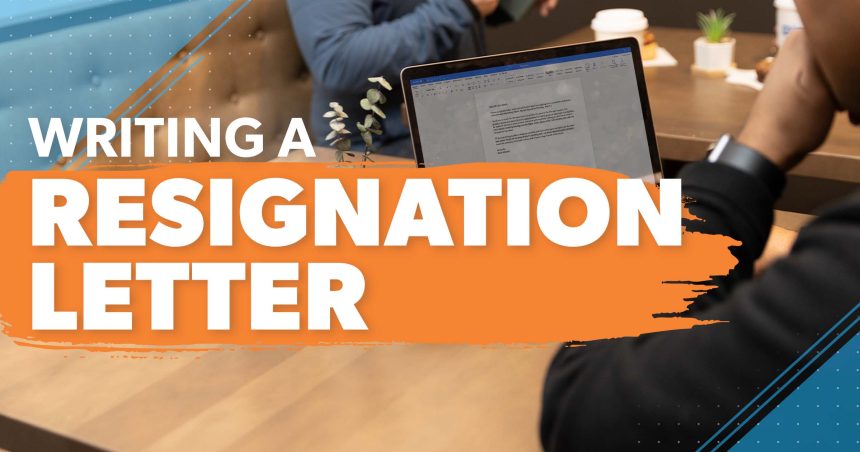Getting ready for a job change is thrilling and a little nerve-wracking. You might be nervous to tell your current employer you’re off to a new adventure in your career. But don’t worry, when you break the news with a resignation letter, you can help make the transition easier . . . and keep your professional relationships intact. I know this isn’t easy to do (especially if you enjoyed your job and the team you worked with), so I’ve put together a few tips for how to write a resignation letter that will keep you from burning bridges and help you move on to your next opportunity with total peace of mind.
What Is a Resignation Letter?
A resignation letter is an email or printed document formally explaining that you’re leaving your job. Although they’re usually required for HR records, resignation letters should never replace a conversation with your boss about moving on from the company. At the bare minimum, it’s good quitting etiquette to send one before heading out the door. Unless email-only resignations are a company policy or you have an unusual, urgent situation that makes resigning in person impossible, you should always give your leader a resignation letter after talking to them first. (And it doesn’t hurt to CC or give a copy to your HR department too.)
Why It’s Important to Use a Resignation Letter
Writing a resignation letter might seem like a waste of time if you’re going to have a conversation with your boss about leaving anyway. But there are a few reasons why it’s important to use a resignation letter when you leave a company. First, it’ll help you manage the conversation about your transition. It also leaves a paper trail so there’s no confusion about your last day or even how you’re prepared to wrap up projects or train your replacement. And finally, it’s the courteous thing to do—you don’t want to burn any bridges, no matter how much you hated your boss or job.
What to Include in a Letter of Resignation
Resignation letters shouldn’t be too long, but they shouldn’t be one sentence either. They should be just long enough to cover these important points:
- State that you’re leaving. No need to beat around the bush—but do be polite.
- Give a brief explanation as to why you’re leaving. You don’t need to share nitty-gritty negative details, but you can give a general reason.
- Say when your last day in the office will be—and plan enough time to give two weeks’ notice if possible.
- Offer to help make the transition as smooth as possible by training your replacement or wrapping up projects.
- Express gratitude for the time you spent at the company. You don’t have to be dishonest and say things you don’t mean, but in this case, you can find something to say that’s professional and positive.
What NOT to Include in a Letter of Resignation
This is not the time to air your grievances or say anything that could come back to bite you later. Don’t speak negatively about your boss, coworkers, compensation or experience at the company—even if you have plenty of well-founded complaints. Remember, this is a formal record of your departure, and it’ll probably stay in your company’s files for a long time. It could affect your personal brand and chances of getting a letter of recommendation or referral in the future.
You deserve to win at work. Our new book and assessment will show you how.
It’s also not a good idea to rave about your new job in this letter, even if it’s your dream job or will help you pay off debt faster. Don’t say anything that implies the company you’re going to is better or pays more than your current company. Comparison is never a good look.
How to Write a Resignation Letter
Okay, now it’s time to get down to business and actually write the darn thing. Here are seven easy steps to follow when you write a resignation letter:
1. Add a subject line.
Leaving the email subject line blank is a classic mistake—but not on your watch! This doesn’t have to be anything complicated. A simple “[Your Name] – Resignation” will do just fine as a subject line. If your resignation letter is not in email form, you should also include today’s date on the top left side of the page.
2. Formally address your leader.
The standard greeting for a letter like this is, “Dear Mr./Ms. [Your Leader’s Last Name].” That’s best practice here unless you have a leader you’re on first-name basis with. But even so, I’d keep it formal to be safe.
3. Open with a clear statement.
The first sentence of your letter should make it clear this is your formal resignation. Don’t bury the lead, be wishy-washy, or apologize. Just state the facts and keep on moving.
4. (Briefly) say why you’re leaving.
This part is optional, but if you have a solid reason, it doesn’t hurt to give a few details about why you’re moving on. Be honest, but don’t feel the need to make it a long, drawn-out explanation. This could be anything from “I’m pursuing other opportunities” to “I’ve decided to make a mid-life career change” to “I’m moving out of state to be closer to family.” But if your real reason for leaving is because you hate your boss or you think your job is boring, it’s best to leave this part out.
5. Give a concrete last day.
Don’t keep anyone guessing about when your last day in the office will be. Make sure you’ve already decided on your final day in collaboration with your leader, or that you’ve at least made them aware of this date in person. Ideally, it should be two weeks away. Then put this date in your resignation letter so it’s in writing and there’s no possibility of confusion.
6. Offer to help if needed.
Again, this one is optional, but it’s a great way to go the extra mile for your team and your company. This can be as simple as saying, “Please let me know if there’s anything I can do to help.” Or it can be as detailed as saying exactly what you’ll do to make the transition easier, like onboarding and training your replacement. But don’t promise anything you’re not prepared to deliver.
7. Close with gratitude.
This is the most important part in my opinion. No matter how much you disliked your job or coworkers, at the very least, you had a steady paycheck and an opportunity to grow and learn. The only scenario where I could see leaving this out would be if you were abused in some way or it was a hostile work environment—otherwise, thank your leader for your time at the company.
One more note: If you like your coworkers enough to stay in touch with them, or if you want to maintain a good relationship with them for future connections, send them a separate email to explain that you’re leaving, thank them for working with you, and let them know how they can contact you once you’ve left.
Resignation Letter Template
Here’s an example resignation letter that will help you get started. You don’t have to copy this word for word (in fact, you shouldn’t—give it your own personal touch!). But use it as a guide to make sure you get the important points across.
Subject Line (if emailed): [Your Name] – Resignation
Date (if printed):
Dear Mr./Ms. [Last Name],
Please accept this letter as my formal resignation from [Company Name]. I’ve accepted a new position that will provide the specific type of career growth I’m seeking at this time. My last day in the office will be [Date].
Please let me know how I can assist with this transition period. I’m available to help in any way I can. Thank you for everything you’ve done to support and encourage me during my time here. I’m grateful to have had the opportunity to serve this company and our customers, and it’s been a pleasure to work with you and the team.
Sincerely,
[Your Name]
Leave a Good Impression When You Quit
Pretty simple, right? Don’t overthink this. Keep your resignation letter simple, professional and grateful and you’ll leave a good lasting impression. And just remember, once you hit send, you’ll be off on your new adventure with plenty of new experiences to look forward to. Press on!
And if you’re still deciding if it’s time to quit your job, you might need more information before you can make a decision. My free Should I Quit My Job Quiz will help you get more clarity in five minutes or less.
Read the full article here
















